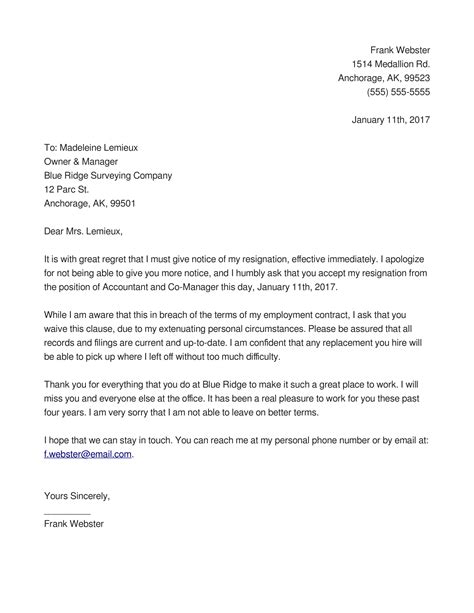Crafting Effective Resignation Email Messages

Resigning from a job is never an easy decision to make. However, when the time comes, it’s important to leave on a good note by crafting an effective resignation email message. This post will guide you through the process of creating a professional and respectful resignation email that will help maintain your relationships with your colleagues and employer.
1. Start with a Polite Greeting
Begin your email with a polite greeting, expressing your gratitude for the opportunity to work with the company. Address your employer or immediate supervisor by name, for example:
Dear [Name],
2. State Your Intention to Resign
Be clear and direct about your intention to resign. State the date of your last day of work, and avoid using negative language or giving too much detail about your reasons for leaving. For example:
Please accept this email as my formal resignation from [Company], effective [Date].
3. Thank the Company and Colleagues
Thank your employer and colleagues for the opportunities and experiences you gained while working with them. This helps to maintain positive relationships and shows your appreciation for the time you spent with the company. For example:
Thank you for the opportunities and experiences I have had while working with [Company]. I am grateful for the support and guidance provided by my colleagues, and I will cherish the memories I have made here.
4. Offer to Assist with the Transition
If possible, offer to assist with the transition process to help minimize the impact of your departure on the company. This shows your professionalism and dedication to ensuring a smooth handover. For example:
I am committed to ensuring a seamless transition and will do everything I can to assist with the handover of my duties and responsibilities. Please let me know how I can be of assistance during this process.
5. End with a Polite Closing
End your email with a polite closing and your contact information. This shows your willingness to maintain a professional relationship with your employer and colleagues, and it allows them to contact you if necessary. For example:
Thank you again for the opportunities and experiences I have had at [Company]. Please let me know if there is anything further I can assist with during this transition. I can be reached at [Email] or [Phone Number].
6. Proofread and Edit
Before sending your resignation email, be sure to proofread and edit it for any errors or typos. This helps to ensure that your message is clear and professional. You may also want to ask a trusted colleague or friend to review it for you.
7. Follow Up with a Thank You Note
Consider following up your resignation email with a thank you note to your employer and colleagues. This can help to maintain positive relationships and leave a lasting impression. For example:
Dear [Name],
Thank you again for the opportunities and experiences I have had at [Company]. I am grateful for the support and guidance provided by my colleagues, and I will cherish the memories I have made here. Please let me know if there is anything further I can assist with during this transition. I can be reached at [Email] or [Phone Number].
Best regards,
[Your Name]
Conclusion
Resigning from a job can be a difficult decision, but by crafting an effective resignation email message, you can leave on a good note. Remember to be clear and direct about your intention to resign, express your gratitude for the opportunities and experiences you have had, and offer to assist with the transition process. By following these steps, you can maintain positive relationships and leave a lasting impression.
FAQs
What should I include in my resignation email?
Your resignation email should include a polite greeting, a clear statement of your intention to resign, gratitude for the opportunities and experiences you have had, an offer to assist with the transition process, a polite closing, and your contact information.
When is the best time to send a resignation email?
The best time to send a resignation email is during normal business hours, when your employer and colleagues are most likely to be available to receive and respond to your message.
Should I give a reason for my resignation in my email?
It’s not necessary to give a detailed explanation for your resignation in your email. Keep your message brief and professional, avoiding any negative language or criticism of the company or colleagues.
What should I do if my employer asks me to stay?
If your employer asks you to stay, it’s important to consider your reasons for resigning and whether or not they can be addressed. If you decide to stay, be clear about your expectations and any changes that need to be made.
James Anderson
James Anderson is a seasoned career transition coach and skills development specialist. With a background in human resources and talent acquisition, James possesses a deep understanding of the challenges individuals face when changing careers. He offers valuable insights and strategies to help individuals navigate career transitions, acquire new skills, and pursue fulfilling opportunities. James is dedicated to assisting individuals in finding their true passion and maximizing their professional potential.
